- Home
- Gore Vidal
The Selected Essays of Gore Vidal Page 2
The Selected Essays of Gore Vidal Read online
Page 2
With preternatural inventiveness, Vidal has recently revived the political pamphlet as a genre. First came Perpetual War for Perpetual Peace, in 2002—his visceral response to 9/11, which drew an enthusiastic response from a wide audience looking around in desperation for clarity and common sense in a time of sheer madness. The essay called “Black Tuesday” opens this pamphlet, and it begins with Vidalian gusto: “According to the Koran, it was on a Tuesday that Allah created darkness.” The author catches our eye, and ear, from the outset, and he rivets our attention as he looks at the “perpetual war” that the United States has waged for the past half century in pursuit of “perpetual peace.” Seven or so trillion dollars have gone into what is euphemistically called “defense,” he notes. Yet there was no advance warning about 9/11 (or, if there was, it was ignored). Vidal sweeps through contemporary American history, observing that the United States always needs “a new horrendous enemy” who must be struck down for the empire to survive. He appends a list of the wars that have absorbed American taxpayer dollars since the Berlin Airlift of 1948. (Compiled by the Federation of American Scientists, it makes for compelling reading, and is included here.)
This book comes right up to the present century with Vidal’s ferocious “State of the Union, 2004”—the opening salvo of a recent pamphlet called Dreaming War. As America’s perpetual Shadow President, Vidal has periodically delivered a mock-version of the president’s annual speech to the assembled House and Senate. Here he casts a cold eye on the efforts of the Bush administration to protect the nation from various Third World enemies, the “Axis of Evil.” His assessment of the current state of affairs in “The United States of Amnesia” is devastating, though he delivers the bad news with a wry smile. Needless to say, the willingness of George Bush and Dick Cheney to trade blood for oil infuriates him. That Bush has “nearly banished truth entirely” in his efforts to remain in power is more than merely annoying to Vidal; it is downright illegal and threatens the very fabric of democracy.
Dark times have befallen the republic, which has never before been so much in need of Gore Vidal. He afflicts the comfortable with a dazzling array of facts and arguments, in a style that compels the attention of readers by its wit and eloquence. Now in his eighties, he remains a figure of immense poise, a unique voice whose luminous, excoriating, funny, and informative essays may well be regarded by future generations as the pinnacle of his achievement.
NOVELISTS AND CRITICS OF THE 1940s
It is a rare and lucky physician who can predict accurately at birth whether a child is to become a dwarf or a giant or an ordinary adult, since most babies look alike and the curious arrangements of chromosomes which govern stature are inscrutable and do not yield their secret order even to the shrewdest eye. Time alone gives definition. Nevertheless, interested readers and writers, like anxious parents and midwives, forever speculate upon the direction and meaning of current literary trends, and professional commentators with grave authority make analyses which the briefest interval often declares invalid. But despite their long historic record of bad guesses, bookish men continue to make judgments, and the recorded derelictions of taste and the erratic judgments of earlier times tend only to confirm in them a sense of complacency: they are not we, and did not know; we know. To disturb this complacency is occasionally worthwhile, and one way of doing it is to exhume significant critical texts from the recent past. Those of the last century, in particular, provide us with fine warnings.
For instance: “We do not believe any good end is to be effected by fictions which fill the mind with details of imaginary vice and distress and crime, or which teach it instead of endeavoring after the fulfillment of simple and ordinary duty to aim at the assurance of superiority by creating for itself fanciful and incomprehensible perplexities. Rather we believe that the effect of such fictions tends to render those who fall under their influence unfit for practical exertion by intruding on minds which ought to be guarded from impurity the unnecessary knowledge of evil.” This was the Quarterly Review on George Eliot’s The Mill on the Floss, and it is really quite well said: the perennial complaint of the professional reviewers and the governors of lending libraries (“enough unpleasant things in the world without reading about them in books”).
Or the following attack on preciosity and obscurantism (Blackwood’s Magazine, 1817): “Mr. Coleridge conceives himself to be a far greater man than the public is likely to admit; and we wish to waken him from what seems to us a most ludicrous delusion. He seems to believe that every tongue is wagging in his praise…. The truth is that Mr. Coleridgeis but an obscure name in English literature.” [Coleridge was forty-five years old at this time and his major work was long since done.] “In London he is well known in literary society for his extraordinary loquacity…” And there follows a prolix attack upon the Biographia Literaria.
Or this excerpt from an 1848 Quarterly Review, deploring the pagan, the sexual, and the vicious:
At all events there can be no interest attached to the writer of Wuthering Heights—a novel succeeding Jane Eyre and purporting to be written by Ellis Bell—unless it were for the sake of more individual reprobation. For though there is a decided resemblance between the two, yet the aspect of the Jane and Rochester animals in their native state, as Catherine and Heatfield [sic], is too odiously and abominably pagan to be palatable even to the most vitiated class of English readers. With all the unscrupulousness of the French school of novels it combines that repulsive vulgarity in the choice of its vice which supplies its own antidote.
Differently worded, these complaints still sound in our press. The Luce editors who cry for an “affirmative” literature echo voices once raised against George Eliot. When middlebrow reviewers deplore “morbidity” in our best writers, they only paraphrase the outrage of those who found the Brontës repellent. And the twitterings of an Orville Prescott when he has discovered a nice and busy book echo the same homely song of those long-dead reviewers who found in the three-volume novels of forgotten lady writers so much warm comfort.
As the essential problems of life remain the same from generation to generation, despite altered conditions, so the problems of literary recognition remain, for contemporaries, peculiarly difficult. Despite the warnings of other times, the impetuous and the confident continue their indiscriminate cultivation of weeds at the expense of occasional flowers.
To consider the writing of any period, including the present, it is perhaps of some importance to examine the climate in which the work is done, to chart if possible the prevailing winds, the weather of the day.
Today there is a significant distinction between the reviewers for popular newspapers and magazines, whom no one interested in literature reads, and the serious critics of the Academy, who write for one another in the quarterlies and, occasionally, for the public in the Sunday supplements. The reviewers are not sufficiently relevant or important to be considered in any but a social sense: they reflect the commonest prejudices and aspirations of the middle class for whom they write, and they need not concern us here.
The critics, however, are significant. They are dedicated men; they are serious; their learning is often respectable. They have turned to the analysis of literature with the same intensity that, born in an earlier time, they might have brought to formal philosophy, to the law, to the ministry. They tend, generically and inevitably, to be absolutists. They believe that by a close examination of “the text,” the laws and the crafty “strategies” of its composition will be made clear and the findings will provide “touchstones” for a comparative criticism of other works. So far so good. They have constructed some ingenious and perhaps valuable analyses of metaphysical verse whose order is often precise and whose most disparate images proceed with a calculable wit and logic.
Unfortunately, the novel is not so easily explicated. It is a loose form, and although there is an inherent logic in those books we are accustomed to call great, the deducible “laws” which governed the execution of Emma
are not going to be of much use in defining The Idiot. The best that a serious analyst can hope to do is comment intelligently from his vantage point in time on the way a work appears to him in a contemporary, a comparative, or a historic light; in which case, his opinion is no more valuable than his own subtlety and knowledge. He must be, as T. S. Eliot put it so demurely, “very intelligent.” The point, finally, is that he is not an empiricist dealing with measurable quantities and calculable powers. Rather, he is a man dealing with the private vision of another, with a substance as elusive and amorphous as life itself. To pretend that there are absolutes is necessary in making relative judgments (Faulkner writes better than Taylor Caldwell), but to believe that there are absolutes and to order one’s judgments accordingly is folly and disastrous. One is reminded of Matthew Arnold and his touchstones; it was his conviction that certain lines from a poet by all conceded great might be compared to those of lesser poets to determine their value. Arnold selected Dante as his great poet, an irreproachable choice, but then he misread the Italian, which naturally caused some confusion. Arnold’s heirs also demand order, tidiness, labels, ultimate assurance that this work is “good” and that work is “bad,” but sooner or later someone misreads the Italian and the system breaks down. In our time there are nearly as many critical systems as there are major critics, which is a pleasing anarchy. The “new critics,” as they have been termed (they at least dislike being labeled and few will now answer when called), are fundamentally mechanics. They go about dismantling the text with the same rapture that their simpler brothers experience while taking apart combustion engines: inveterate tinkerers both, solemnly playing with what has been invented by others for use, not analysis.
Today’s quarterlies are largely house organs for the academic world. They seldom publish imaginative work and one of their most distinguished editors has declared himself more interested in commentaries on writing than in the writing itself. Their quarrels and schisms and heresies do not in the least resemble the Alexandrians whom they occasionally mention, with involuted pride, as spiritual ancestors. Rather, one is reminded of the semantic and doctrinal quarrels of the church fathers in the fourth century, when a diphthong was able to break the civilized world in half and spin civilization into nearly a millennium of darkness. One could invent a most agreeable game of drawing analogies between the fourth century and today. F. R. Leavis and Saint Jerome are perfectly matched, while John Chrysostom and John Crowe Ransom suggest a possibility. The analogy works amusingly on all levels save one: the church fathers had a Christ to provide them with a primary source of revelation, while our own dogmatists must depend either upon private systems or else upon those proposed by such slender reeds as Matthew Arnold and T. S. Eliot, each, despite his genius, a ritual victim as well as a hero of literary fashion.
But the critics are indefatigable and their game is in earnest, for it is deeply involved not only with literature but with such concrete things as careers in the Academy, where frequent and prestigious publication is important. Yet for all their busyness they are by no means eclectic. In a Henry James year not one will write an analysis of George Meredith. They tend to ignore the contemporary writers, not advancing much later than F. Scott Fitzgerald, whose chief attraction is that he exploded before he could be great, providing a grim lesson in failure that, in its completeness, must be awfully heartening when contemplated on the safe green campus of some secluded school.
Of the critics today, Edmund Wilson, the most interesting and the most important, has shown virtually no interest in the writing of the last fifteen years, his talents engaged elsewhere in the construction of heroic sepulchers for old friends like Fitzgerald and Millay, a likable loyalty but a not entirely useful one. He can of course still make a fine point during a Peacock flurry and he has been startling brilliant in recent essays on Grant and Lincoln, but one can search the pages of that book of his which he calls a “Literary Chronicle of the Forties” without coming upon any but the most cursory mention of the decade’s chief talents.
Malcolm Cowley, a good professional literary man, had some sharp things to say recently about the young writers. Although he made almost no reference to the better writing of the day, he did say some accurate things about the university-trained writers, whose work, he feels, is done with too reverent an eye upon their old teachers, the new critics. Cowley speaks out for a hearty freedom from university influence, citing his own generation (the men of the 1920s are loyal to their time if not to one another: everyone was a genius then, and liquor was cheap abroad) as being singularly independent of formal instruction. Yet McCullers, Bowles, Capote, etc. (like Hemingway, Faulkner, O’Neill, etc.) are not graduates of universities, and many of the other young lions have had enough war to wash them clean of academicism. Mr. Cowley, like most commentators, tends to bend whatever he finds to his premise. To him there is no single genius who can set the tone for a generation but one wonders if he would recognize that great writer any more than Lord Jeffrey, a century ago, was able to recognize his time’s greatness? For the Cowleys, the novel stopped at Gatsby. That Carson McCullers (whom he does not mention) has influenced many works, that Tennessee Williams has influenced the theater of the world, that Paul Bowles, among others, has reshaped the short story—none of these things impinges on him.
Mr. Cowley’s gloom is supported by the young John W. Aldridge, Jr. In his amusing novel After the Lost Generation he got onto the subject of “values” (by way of Lionel Trilling and perhaps V. S. Pritchett). After discussing a number of fictitious characters who were writing books (using real, if unlikely, names like Truman Capote and Gore Vidal), he “proved,” by the evidence of their works, that they had all failed of greatness because, except for “a pocket or two of manners” (the Army; the South; here and there in New England), there was really nothing left to write about, none of that social conflict out of which comes art, like sparks from a stone grinding metal. His coda indicated that a young writer of singular genius is at this moment hovering in the wings awaiting his cue. It will be interesting to read Mr. Aldridge’s next novel.
Yet Mr. Aldridge does have a case: the old authority of church, of settled Puritan morality, has broken down, and if one’s vision is historically limited to only a few generations in time it might seem that today’s novelists are not having the fun their predecessors in the 1920s had, breaking cultural furniture. But to take a longer view, one must recall that the great times for literature and life were those of transition: from the Middle Ages to modern times by way of the Renaissance, from dying paganism to militant Christianity by way of the Antonines, and so on back to Aristophanes. The opportunity for the novelist when Mr. Aldridge’s “values” are in the discard is fabulous: to create without wasting one’s substance in political or social opposition. What could be more marvelous! Neither Virgil nor Shakespeare had to attack their day’s morality or those in authority. They were morally free to write of life, of Henry James’s “the main thing.” There were certainly inequities and barbarities in sixteenth-century England and first-century Rome, but the writers, affected partly by convention (not to mention the Star Chamber), did not address themselves to attacks upon the government or the time’s morality, which, apparently, did not obsess them. Writers, after all, are valuable in spite of their neuroses, obsessions, and rebellions, not because of them. It is a poor period indeed which must assess its men of letters in terms of their opposition to their society. Opposition to life’s essential conditions perhaps, or to death’s implacable tyranny, is something else again, and universal; but novels, no matter how clever, which attempt to change statutes or moral attitudes are, though useful at the moment, not literature at all. In fact, if Mr. Aldridge were right in his proposition we would have not a barren, “subjectless” world for literature but the exact opposite: a time of flowering, of creation without waste and irrelevancy. Unhappily, American society has not changed that much in the last thirty years. There is as much to satirize, as much to protest as ever bef
ore, and it will always be the task of the secondary figures to create those useful public books whose momentary effect is as stunning as their literary value is not.
There is no doubt but that the West has come to Malraux’s “twilight of the absolute.” One awaits with hope the period between when, unencumbered by the junk of dogma, writers can turn to the great things with confidence and delight. Loss of authority by removing targets does not destroy the true novelist, though it eliminates the doctrinaire and those busy critics who use the peculiar yardstick of social usefulness to determine merit. (It is no accident that the few works admired by Mr. Aldridge are those compositions which sturdily and loudly discuss the social scene, or some “pocket” of it—interesting books, certainly, whose public effect is often admirable; though the noise they create seldom persists long enough to enjoy even a first echo.) Actually, one might say that it is only the critic who suffers unduly from the lack of authority. A critic, to criticize, must, very simply, have standards. To have standards he must pretend there is some optimum against which like creations can be measured. By the nature of his own process he is eventually forced, often inadvertently, to accept as absolute those conditions for analysis which he has only tentatively proposed. To be himself significant he needs law and revealed order; without them he is only a civilized man commenting for others upon given works which, temperamentally, he may or may not like without altering the value, if any, of the work examined. With a law, with authority, with faith he becomes something more grand and meaningful; the pythoness through whom passes Apollo’s word.

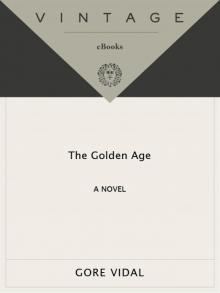 The Golden Age: A Novel
The Golden Age: A Novel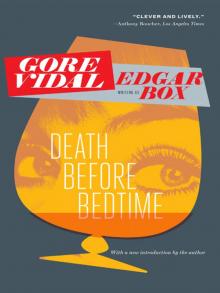 Death Before Bedtime
Death Before Bedtime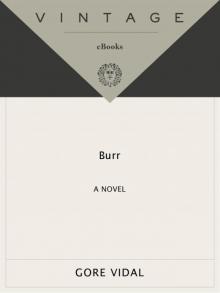 Burr
Burr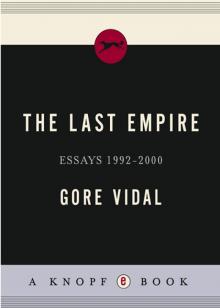 The Last Empire
The Last Empire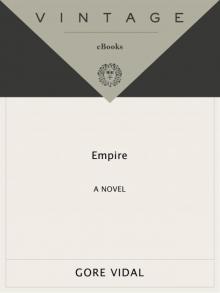 Empire: A Novel
Empire: A Novel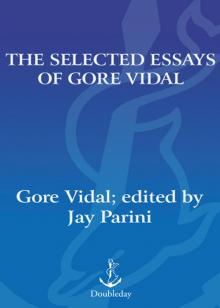 The Selected Essays of Gore Vidal
The Selected Essays of Gore Vidal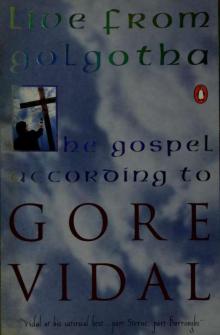 Live From Golgotha
Live From Golgotha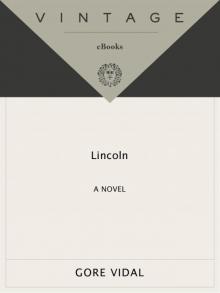 Lincoln
Lincoln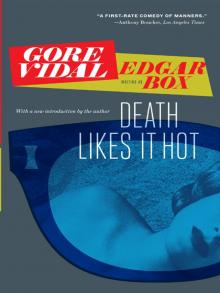 Death Likes It Hot
Death Likes It Hot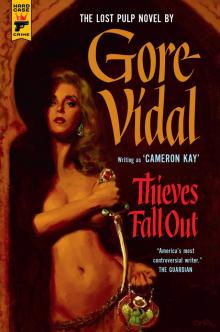 Thieves Fall Out (Hard Case Crime)
Thieves Fall Out (Hard Case Crime)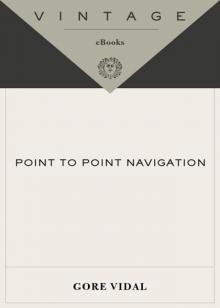 Point to Point Navigation
Point to Point Navigation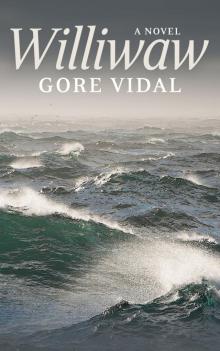 Williwaw
Williwaw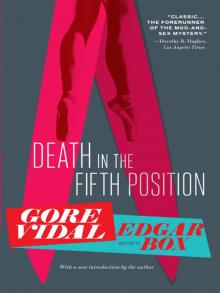 Death in the Fifth Position
Death in the Fifth Position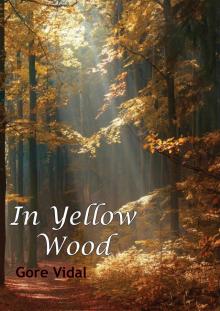 In a Yellow Wood
In a Yellow Wood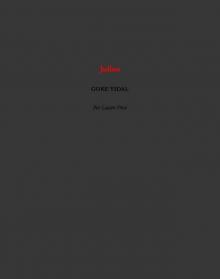 Julian
Julian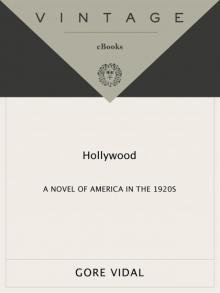 Hollywood
Hollywood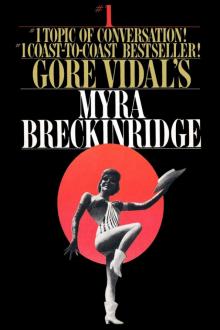 Myra Breckinridge
Myra Breckinridge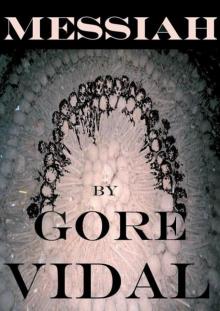 Messiah
Messiah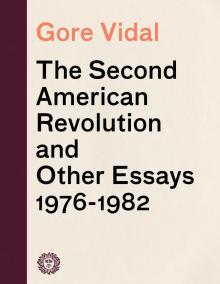 The Second American Revolution and Other Essays 1976--1982
The Second American Revolution and Other Essays 1976--1982 Homage to Daniel Shays
Homage to Daniel Shays Empire
Empire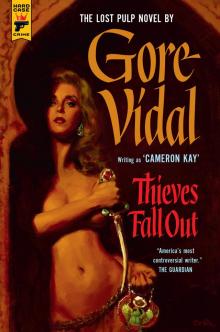 Thieves Fall Out
Thieves Fall Out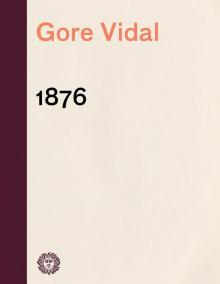 1876
1876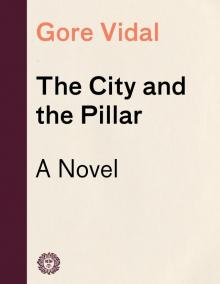 The City and the Pillar
The City and the Pillar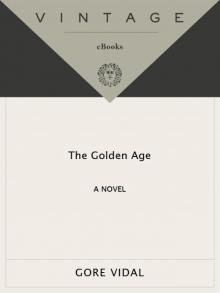 The Golden Age
The Golden Age At Home
At Home